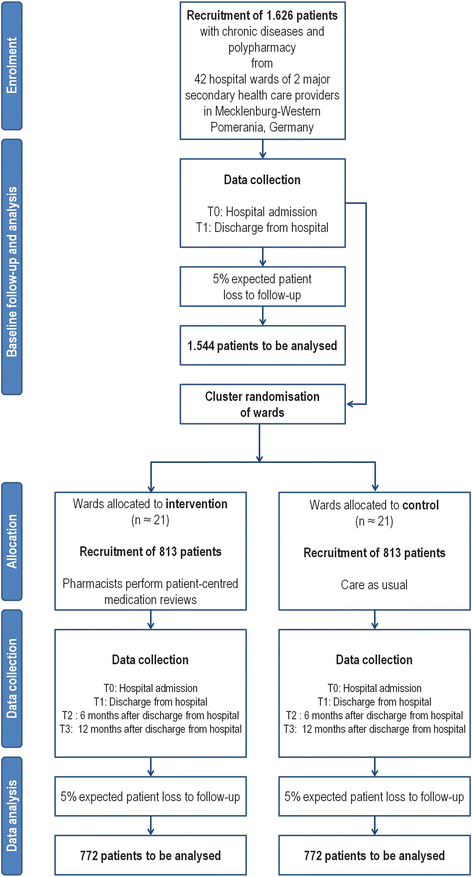Optimizing polypharmacy among elderly hospital patients with chronic diseases--study protocol of the cluster randomized controlled POLITE-RCT trial
- PMID: 25287853
- PMCID: PMC4192341
- DOI: 10.1186/s13012-014-0151-7
Optimizing polypharmacy among elderly hospital patients with chronic diseases--study protocol of the cluster randomized controlled POLITE-RCT trial
Abstract
Background: Treatment of patients with multimorbidity is challenging. A rational reduction of long-term drugs can lead to decreased mortality, less acute hospital treatment, and a reduction of costs. Simplification of drug treatment schemes is also related to higher levels of patient satisfaction and adherence. The POLITE-RCT trial will test the effectiveness of an intervention aiming at reducing the number of prescribed long-term drugs among multimorbid and chronically ill patients. The intervention focuses on the interface between primary and secondary health care and includes a pharmacist-based, patient-centered medication review prior to the patient's discharge from hospital.
Methods: The POLITE-RCT trial is a cluster randomized controlled trial. Two major secondary health care providers of Mecklenburg-Western Pomerania, Germany, take part in the study. Clusters are wards of both medical centers. All wards where patients with chronic diseases and multimorbidity are regularly treated will be included. Patients aged 65+ years who take five or more prescribed long-term drugs and who are likely to spend at least 5 days in the participating hospitals will be recruited and included consecutively. Cluster-randomization takes place after a six-month baseline data collection period. Patients of the control group receive care as usual. The independent two main primary outcomes are (1) health-related quality of life (EQ-5D) and (2) the difference in the number of prescribed long-term pharmaceutical agents between intervention and control group. The secondary outcomes are appropriateness of prescribed medication (PRISCUS list, Beers Criteria, MAI), patient satisfaction (TSQM), patient empowerment (PEF-FB-9), patient autonomy (IADL), falls, re-hospitalization, and death. The points of measurement are at admission to (T0) and discharge from hospital (T1) as well as 6 and 12 months after discharge from the hospital (T2 and T3). In 42 wards, 1,626 patients will be recruited.
Discussion: In case of positive evaluation, the proposed study will provide evidence for a sustainable reduction of polypharmacy by enhancing patient-centeredness and patient autonomy.
Trial registration: Current Controlled Trials ISRCTN42003273.
Figures
References
-
- Casselli G, Mesle F, Vallin J. Epidemiologic transition theory exceptions. Genus: J Popul Sci. 2002;9:9–51.
-
- Schäfer I, von Leitner EC, Schön G, Koller D, Hansen H, Kolonko T, Kaduszkiewicz H, Wegscheider K, Glaeske G, van den Bussche H. Multimorbidity patterns in the elderly: a new approach of disease clustering identifies complex interrelations between chronic conditions. PLoS One. 2010;5(12):e15941. doi: 10.1371/journal.pone.0015941. - DOI - PMC - PubMed
Publication types
MeSH terms
Substances
Associated data
LinkOut - more resources
Full Text Sources
Other Literature Sources
Medical



